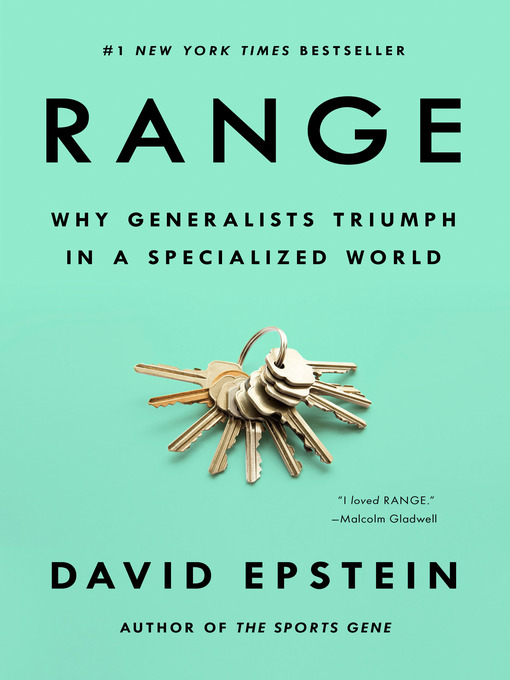
Range
Why Generalists Triumph in a Specialized World
کتاب های مرتبط
- اطلاعات
- نقد و بررسی
- دیدگاه کاربران
نقد و بررسی

March 4, 2019
Journalist and self-identified generalist Epstein (The Sporting Gene) delivers an enjoyable if not wholly convincing work of Gladwellian pop-psychology aimed at showing that specialization is not the only path to success. His survey finds no shortage of notable athletes, artists, inventors, and businesspeople who followed atypically circuitous paths. Some are household names, such as J.K. Rowling, who by her own admission “failed on an epic scale” before deciding to pursue writing, and Duke Ellington, who briefly studied music as a child before becoming more interested in basketball and drawing, only returning to music after a chance encounter with ragtime. Others are more obscure, such as Nintendo’s Gunpei Yokoi, who turned his limitations as an electronics engineer to his advantage when he created the cheap-to-produce, durable Game Boy, and Jack Cecchini, “one of the rare musicians who is world class in both jazz and classical.” Epstein’s narrative case studies are fascinating, but the rapid-fire movement from one sketch to the next can create the impression of evidence in search of a thesis. While this well-crafted book does not entirely disprove the argument for expertise, Epstein does show that, for anyone without 10,000 hours to devote to mastering a single skill, there is hope yet. Agent: Chris Parris-Lamb, Gernert Company.

March 1, 2019
Epstein follows up The Sports Gene, which explored the roots of elite sport performance, with this intriguing analysis of successful artists, musicians, inventors, forecasters, scientists, and athletes. The author's revelation is that generalists, not specialists, are more primed to excel, with generalists often finding their path late and participating in many interests. The author's refreshing viewpoint is based on deep research into what characterizes successful professional performance. Instead of intense specialization, Epstein suggests professionals strive to cultivate inefficiency, fail tests in order to learn, and explore various career scenarios, arguing that deep knowledge in a single area can limit a person's agility and creativity. This will likely stir controversy in the field of professional sports, but the push to focus early and narrowly extends well beyond sports, says the author, as evidenced in Malcolm Gladwell's Outliers and Matthew Syed's Bounce. VERDICT All readers eager to look into the next trench over for innovative ideas to solve their problems will welcome this remarkable, densely packed work that will prove essential for all university libraries supporting AAA level athletics programs, colleges of business, and human resource development.--Dale Farris, Groves, TX
Copyright 2019 Library Journal, LLC Used with permission.

March 15, 2019
Why diverse experience and experimentation are important components of professional accomplishment.Arguing against the idea that narrow specialization leads to success, journalist Epstein (The Sports Gene: Inside the Science of Extraordinary Athletic Performance, 2013) mounts convincing evidence that generalists bring more skill, creativity, and innovation to work in all fields. The author begins by contrasting the career trajectories of Tiger Woods, who began training as a golfer before he was 1, and Roger Federer, who dabbled in a range of sports before, as a teenager, he "began to gravitate more toward tennis." Although he started later than players who had worked with coaches, sports psychologists, and nutritionists from early childhood, a late start did not impede his development. His story, Epstein discovered, is common. When psychologists have studied successful individuals' "paths to excellence," they have found "most common was a sampling period" followed only later by focus and increased structure. "Hyperspecialization," writes the author, is not a requisite for achievement, and he offers abundant lively anecdotes from music, the arts, business, science, technology, and sports. Drawing on studies by cognitive psychologists and educators, Epstein examines how knowledge develops and, equally important, how it is assessed. He distinguishes between teaching strategies that emphasize repeated practice, leading to "excellent immediate performance" on tests, and "interleaving," an approach that develops inductive reasoning, in which students "learn to create abstract generalizations that allow them to apply what they learned to material they have never encountered before." Interleaving, he asserts, applies to both physical and mental skills: to a pianist and mathematician as well as to Shaquille O'Neal. The author critiques higher education for rushing students to specialization even though "narrow vocational training" will not prepare them for jobs "in a complex, interconnected, rapidly changing world." Although he admits "that passion and perseverance" are important precursors of excellence, "a change of interest, or a recalibration of focus" can also be critical to success.A fresh, brisk look at creativity, learning, and the meaning of achievement.
COPYRIGHT(2019) Kirkus Reviews, ALL RIGHTS RESERVED.

























دیدگاه کاربران